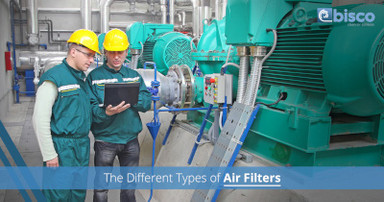Aug 5th 2017
The Different Types of Air Filters
If you work in the industrial manufacturing industry, there’s a good chance a lot of your time and energy has gone into building and maintaining your air pollution control system. Depending on the equipment you use in your facility, air filters may be required to assist in the efficient removal of particles and dirt from the air. At Bisco Enterprise, we offer a large selection of replacement air filters online and we’re proud to be a leading provider of air cleaning and dust collection products. If you currently utilize an air filtration system in your workplace, you may be curious about the different types of air filters available. In this article, we’ll discuss some of the most popular kinds of air filters so you can make the best decision when it comes time to order new air filters for your facility.
Ionic Air Filters
Also known as ionizers, ionic air filters rely heavily on voltage to charge the surrounding air molecules. In many cases, these kinds of filters will produce negatively charged ions, also known as anions, which attract particles in the air. Once the air particles come in contact with the anions, they are ionized and completely removed from the air stream.
HEPA Air Filters

HEPA air filters, otherwise known as high efficiency particulate absorbing air filters, are stronger and more efficient than ionic air filters. HEPA air filters have the ability to remove up to 99.97 percent of airborne particles larger than 0.3 microns, making them extremely effective air sanitizers for commercial air filtration. This type of filter is mostly composed of fiberglass fiber mats, which help to trap particles as air flow pushes through them. The ultimate effectiveness of a HEPA filter will depend largely on the diameter of the fiber and the air filter’s overall thickness.
HEPA filters trap air particles in a few different ways. First, the air filter intercepts the particles as air flows through the filter. Any particles that are within close proximity to the filter are caught and trapped. In addition to their inception properties, HEPA air filters can also instigate impaction, which is when particles collide with the fibers and are in turn, caught by the filter. Since HEPA air filters offer an extremely high level of efficiency, they are commonly used in medical industries to remove bacteria and prevent contamination. Great for clean rooms and high sensitized hospital wards, HEPA air filters are among the best filters available. If you’re in need of HEPA air filters for your industrial or manufacturing facility, browse Bisco Enterprise’s selection of HEPA filters online.
Carbon Air Filters
Carbon air filters use pieces of activated carbon to remove airborne contaminants and impurities by utilizing the properties of chemical absorption. Activated pieces of carbon are often found in a granular or powdered block form that have been treated to be extremely porous. When the organic air compounds or water react to the activated carbon, absorption occurs. This causes the unwanted air particles and debris to stick to the filter, helping to reduce the amount of hazardous components in the air. While activated carbon has a number of beneficial properties, some of the most popular include:
- Activated carbon can absorb almost any vapor contaminant
- It has a large capacity for organic molecules, especially solvents
- Can work well under a wide range of temperature and humidity conditions
- Absorbs odors and chemicals and is safe to handle
- Has the ability to absorb and retain a wide variety of chemicals at the same time
There are many benefits to using carbon air filters and activated carbon filters can even be used in conjunction with HEPA filters to trap allergens and impurities such as:
- Dust
- Lint
- Smoke
- Pet dander
- Mold
- Chemicals
If you’re shopping for activated carbon air filters, browse Bisco Enterprise’s large selection of carbon filters online today!
UV Light Air Filters
Ultraviolet light air filters use a chemical reaction to reduce air particles and contaminants from the air. This reaction occurs when titanium dioxide is exposed to a UV light, creating a photochemical process to neutralize bacteria and air particles. A UV light air filter can convert molecules of oxygen and water found in the air into ozone and hydroxyl. The effectiveness of this type of air filter is dependent upon the wattage of the light and the amount of exposure to it. High intensity UV light has the ability to break down most carbon based organic compounds, making these filters a great companion to HEPA filters in medical applications.
Bisco Enterprise is a leading provider of pollution control solutions, including air filters, dust collectors and fume arms. Whether you need a customized collection system to capture welding fumes, powders or dusts, you’re sure to find exactly what you need from our experts. Browse our air filtration systems online or contact us today!

